Sustainable Kitchen Remodeling: Eco-Friendly Choices for Environmentally Conscious Boston Homeowners
Introduction
Create a beautiful, functional kitchen that reduces your environmental impact while providing long-term cost savings through sustainable materials and energy-efficient design choices.
At Golden Hammer Remodeling, we’ve witnessed a significant shift among Boston homeowners toward environmentally responsible renovation choices that align with both personal values and long-term financial benefits. Throughout Newton, Lexington, and the broader Boston metro area, families are increasingly seeking kitchen renovations that minimize environmental impact while maximizing functionality, beauty, and home value. Sustainable kitchen remodeling encompasses far more than simply choosing recycled materials – it involves a comprehensive approach to design, material selection, energy efficiency, and waste reduction that creates healthier living environments while reducing utility costs and environmental footprint. The most successful sustainable kitchen projects balance environmental responsibility with practical functionality, resulting in spaces that serve families beautifully while supporting broader environmental goals. Modern sustainable materials and technologies have evolved to offer performance and aesthetics that rival or exceed traditional options, making eco-friendly kitchen renovation an increasingly attractive choice for discerning homeowners who refuse to compromise on quality or style in pursuit of environmental responsibility.
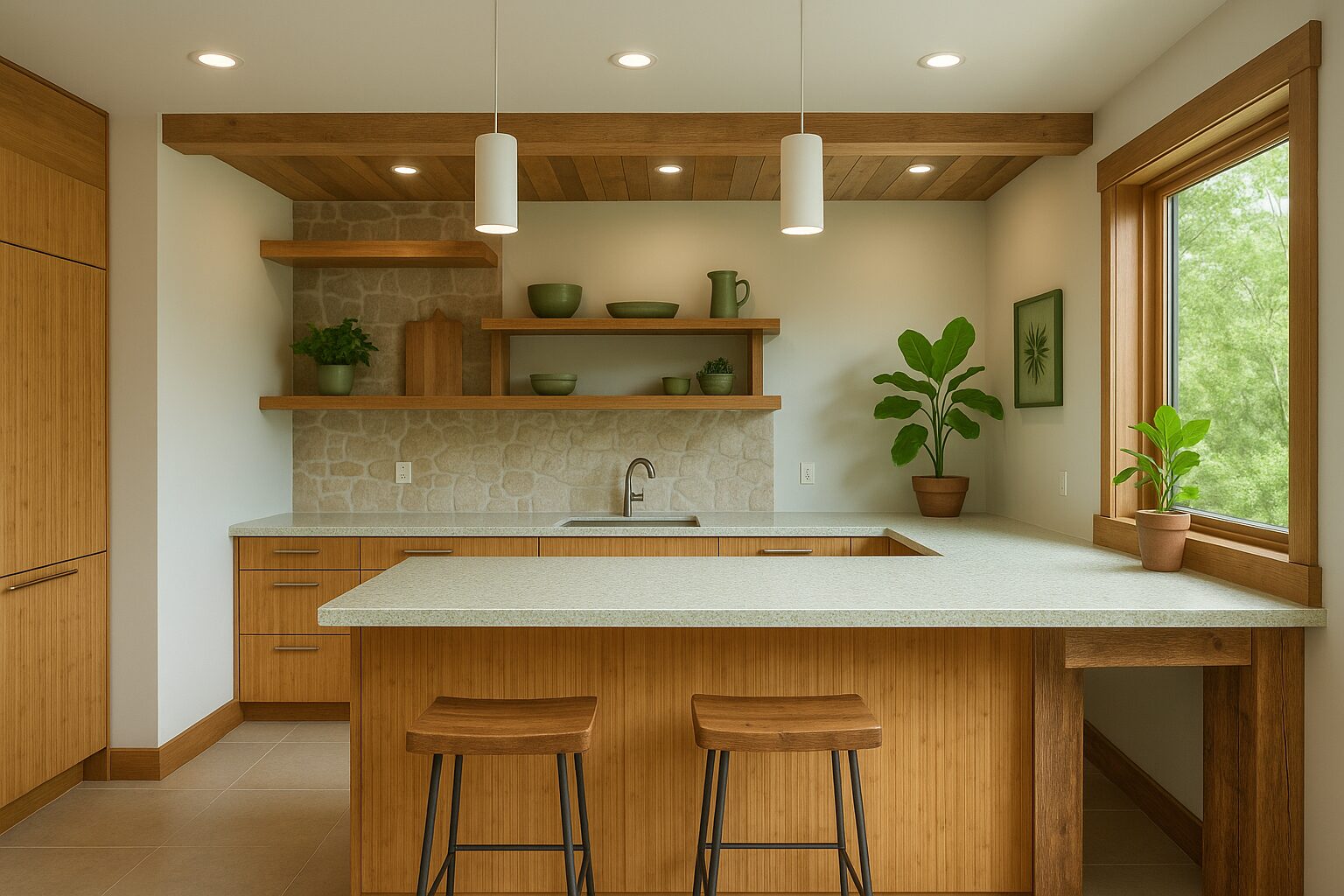
1. Sustainable Cabinet Materials and Construction
Kitchen cabinets represent the largest material investment in most kitchen renovations, making cabinet material selection crucial for environmentally conscious homeowners seeking to minimize their renovation’s environmental impact while ensuring long-term durability and beauty.
Formaldehyde-free and low-VOC cabinet materials have revolutionized sustainable kitchen design by eliminating harmful chemical emissions that can affect indoor air quality for years after installation. Traditional particleboard and MDF cabinets often contain formaldehyde-based adhesives that continue releasing volatile organic compounds long after installation, but modern alternatives use safer binding agents that maintain structural integrity without compromising indoor air quality. At Golden Hammer Remodeling, we source cabinets constructed with formaldehyde-free cores and low-VOC finishes that meet strict environmental standards while providing the durability and beauty our clients expect from premium kitchen cabinetry.
Reclaimed and recycled wood options provide stunning aesthetic appeal while giving new life to materials that might otherwise end up in landfills. Reclaimed barn wood, salvaged from historic New England structures, offers unique character and patina that cannot be replicated in new materials. These reclaimed materials often feature superior grain patterns and density compared to modern lumber, having been harvested from old-growth forests decades or centuries ago. Recycled wood products, manufactured from post-consumer waste wood, provide consistent quality and appearance while diverting waste from landfills and reducing demand for virgin timber harvesting.
FSC-certified wood ensures that new wood products come from responsibly managed forests that maintain biodiversity, protect indigenous communities, and support sustainable harvesting practices. The Forest Stewardship Council certification provides third-party verification that wood products meet strict environmental and social standards throughout the supply chain. FSC-certified cabinet materials are widely available in popular species like maple, oak, and cherry, allowing homeowners to choose sustainable options without compromising on preferred aesthetics or functionality.
Bamboo cabinetry represents an innovative sustainable option that grows rapidly and regenerates without replanting, making it one of the most renewable cabinet materials available. Modern bamboo cabinet construction techniques produce materials with strength and durability comparable to traditional hardwoods, while bamboo’s natural antimicrobial properties provide additional benefits in kitchen environments. The light, consistent grain pattern of bamboo complements both traditional and contemporary kitchen designs, offering versatility that works well with various aesthetic preferences.
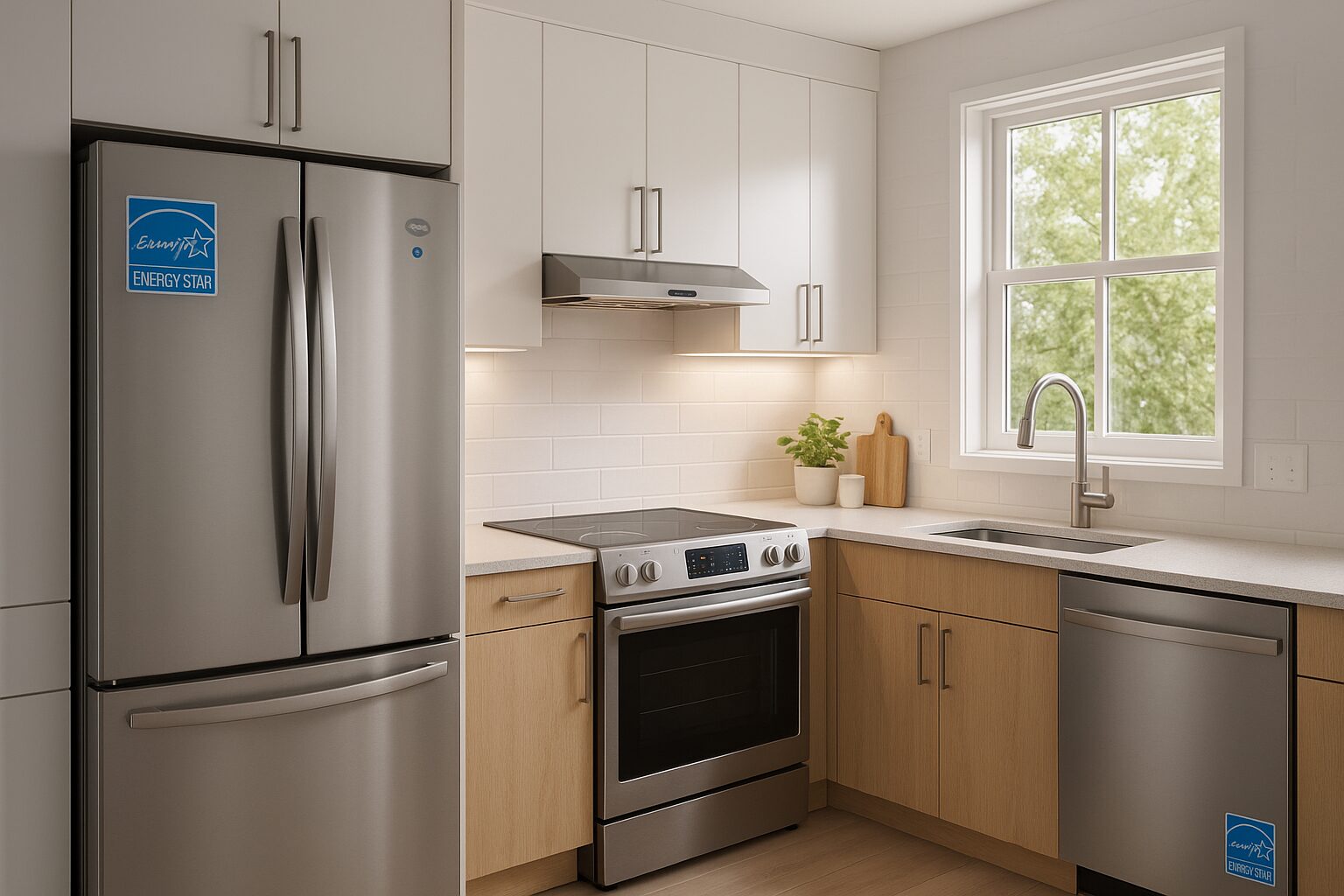
2. Energy-Efficient Appliances and Systems
Modern energy-efficient appliances significantly reduce both environmental impact and long-term operating costs, making them essential components of sustainable kitchen renovations that provide immediate and ongoing benefits to environmentally conscious homeowners.
ENERGY STAR certified appliances meet strict efficiency guidelines set by the Environmental Protection Agency, using 10-50% less energy than standard models while maintaining superior performance. These appliances reduce greenhouse gas emissions and utility costs while often providing enhanced features and reliability compared to less efficient alternatives. At Golden Hammer Remodeling, we help clients select ENERGY STAR appliances that match their cooking habits and family needs while maximizing energy savings and environmental benefits.
Induction cooktops represent the most energy-efficient cooking technology available, transferring energy directly to cookware rather than heating surrounding air like gas or traditional electric ranges. This direct energy transfer results in faster cooking times, more precise temperature control, and significantly reduced energy consumption compared to conventional cooking methods. Induction technology also improves kitchen air quality by eliminating combustion byproducts associated with gas cooking, creating healthier indoor environments while reducing energy costs.
High-efficiency refrigeration technology has advanced dramatically in recent years, with modern refrigerators using 75% less energy than models from the 1970s while providing larger capacity and enhanced features. Variable-speed compressors, improved insulation, and smart temperature management systems maintain optimal food storage conditions while minimizing energy consumption. Many modern refrigerators also feature advanced water filtration systems that reduce reliance on bottled water, further supporting environmental goals.
Smart appliance integration allows for optimized energy usage through automated scheduling and monitoring that reduces consumption during peak demand periods. Smart dishwashers can delay operation until off-peak hours when electricity rates are lower and grid demand is reduced. Smart ovens can preheat efficiently and maintain precise temperatures while using minimal energy. These intelligent systems often provide usage monitoring that helps homeowners understand and optimize their energy consumption patterns.
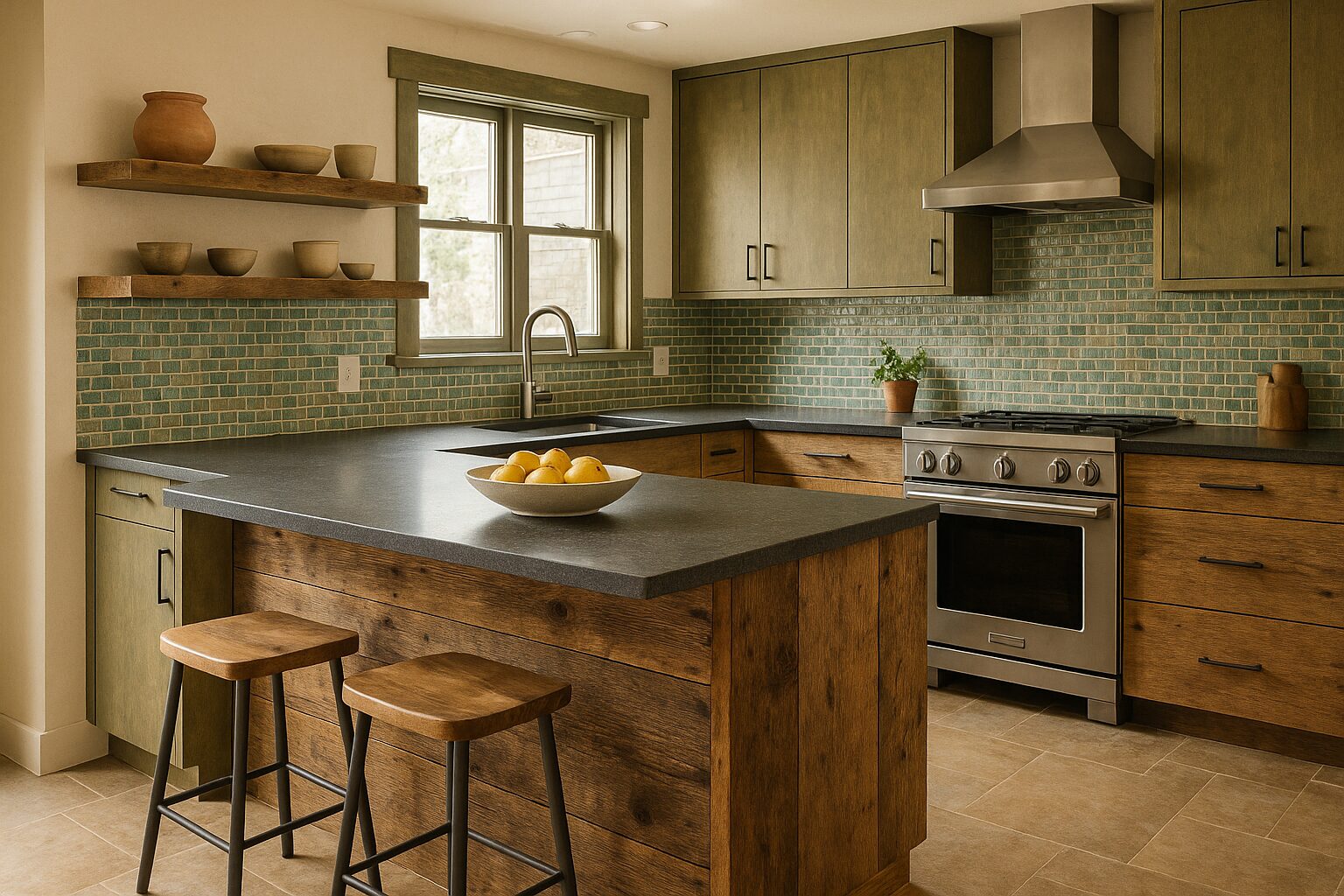
3. Sustainable Countertop and Flooring Options
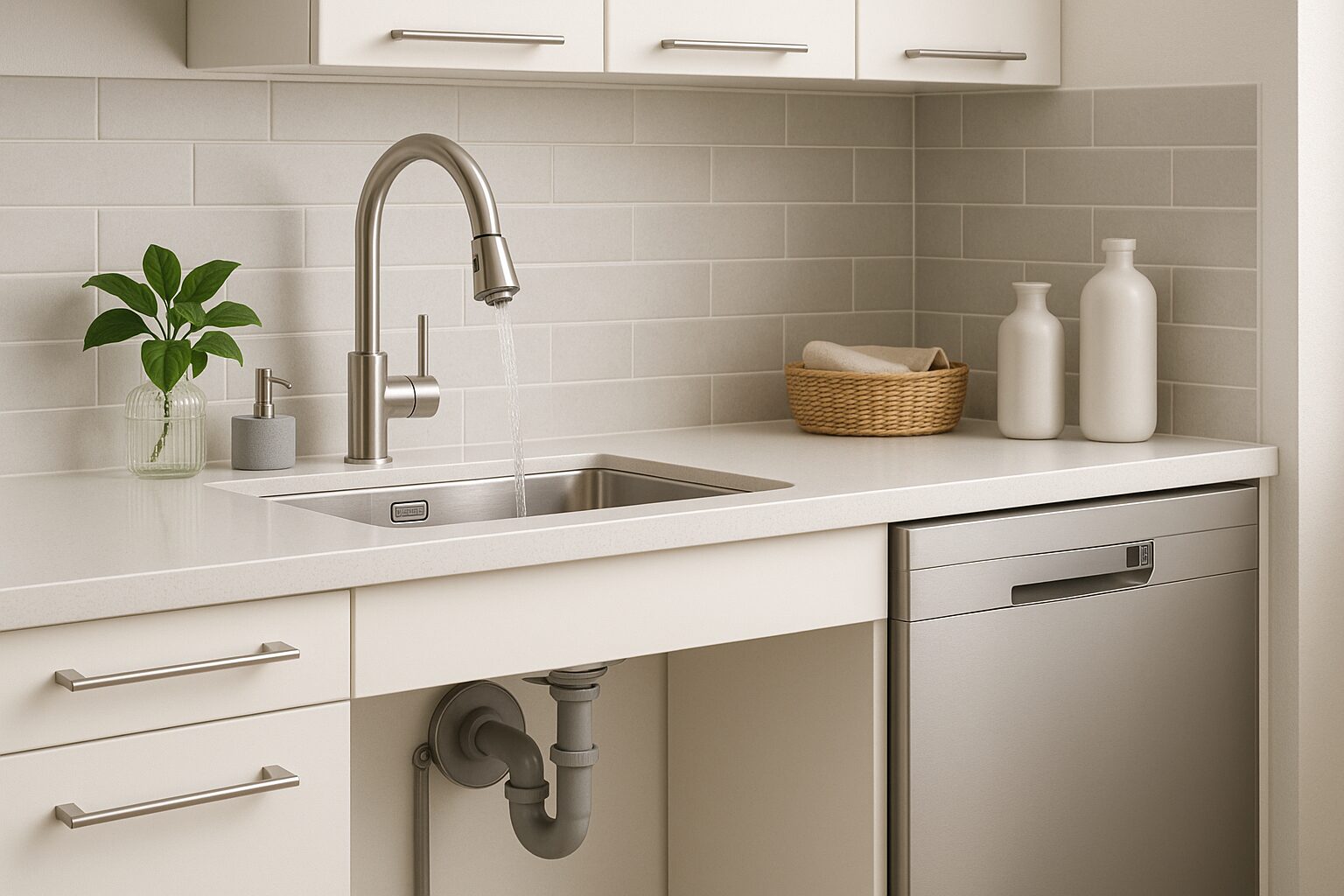
4. Water Conservation and Waste Reduction Strategies
Sustainable kitchen design incorporates water conservation technologies and waste reduction strategies that minimize environmental impact while often providing convenience and cost savings for homeowners committed to environmental responsibility.
Low-flow faucets and aerators reduce water consumption without compromising functionality, using advanced engineering to maintain strong water pressure while using significantly less water than traditional fixtures. Modern low-flow kitchen faucets often include pull-out sprayers and multiple flow options that enhance functionality while conserving water. These fixtures can reduce kitchen water usage by 30-50% compared to older models, resulting in lower utility bills and reduced environmental impact.
Efficient dishwasher selection and usage practices significantly impact both water and energy consumption in sustainable kitchens. Modern ENERGY STAR dishwashers use as little as 3 gallons of water per cycle compared to 27 gallons for hand washing, while also using less energy for water heating. Proper loading techniques and appropriate cycle selection maximize efficiency while ensuring excellent cleaning results. Some advanced models include soil sensors that adjust water usage based on actual cleaning needs, further optimizing resource consumption.
Greywater systems capture and treat water from kitchen sinks for reuse in landscape irrigation, reducing both water consumption and wastewater generation. While not appropriate for all situations, greywater systems can significantly reduce household water usage in suitable applications. These systems require careful planning and often local permitting, but they provide substantial environmental benefits in appropriate installations.
Composting integration transforms kitchen waste into valuable soil amendment while reducing landfill waste and methane emissions associated with organic waste decomposition. Built-in composting systems or designated composting areas make it convenient to divert organic kitchen waste from landfills while creating valuable compost for gardens and landscaping. Modern composting solutions include odor-controlled indoor systems and efficient outdoor composting bins that accelerate decomposition while minimizing maintenance requirements.
Recycling station integration ensures that kitchen renovations include convenient, organized spaces for sorting and storing recyclable materials. Well-designed recycling stations encourage consistent recycling habits while maintaining kitchen organization and cleanliness. These systems can be integrated into cabinet designs or island configurations, providing easy access while keeping recyclables organized and out of sight until collection day.
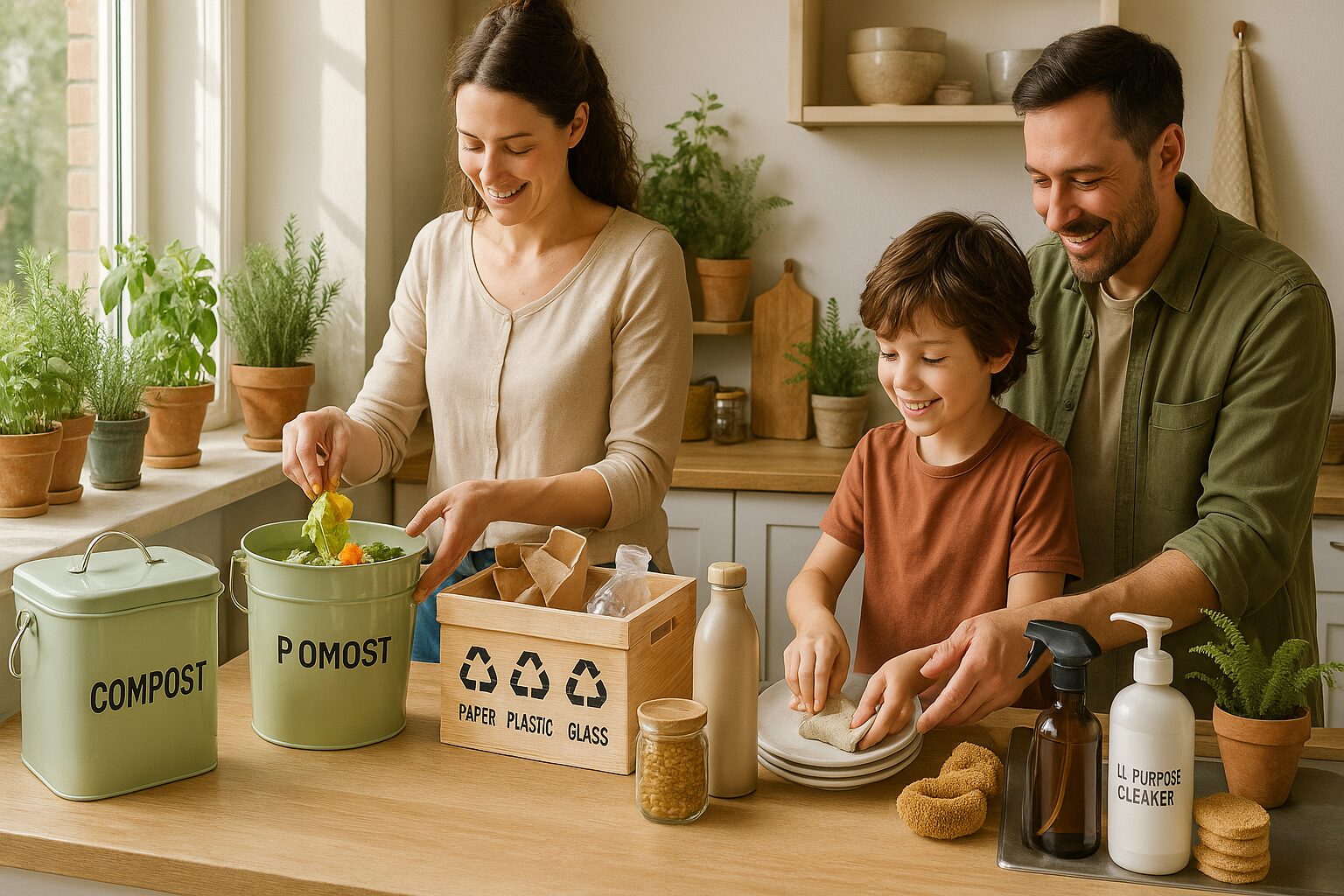
Call to Action
At Golden Hammer Remodeling, we’re committed to helping environmentally conscious Boston homeowners create beautiful, functional kitchens that align with their values while providing superior performance and long-term value. Our expertise in sustainable materials, energy-efficient systems, and eco-friendly design practices ensures that your kitchen renovation supports both your family’s needs and your environmental goals.
Ready to create a sustainable kitchen that reduces your environmental impact while enhancing your daily cooking experience? Contact Golden Hammer Remodeling today to schedule a consultation with our sustainable design specialists. We’ll work with you to select eco-friendly materials and energy-efficient systems that create a beautiful, responsible kitchen you’ll be proud to use and showcase for years to come.
Frequently Asked Questions (FAQ)
1. Do sustainable kitchen materials cost more than traditional options?
2. Are sustainable kitchen materials as durable as traditional options?
3. How much can energy-efficient appliances reduce my utility bills?
4. What certifications should I look for in sustainable kitchen materials?
5. Can I incorporate sustainable features into a traditional kitchen design?
6. How do I maintain sustainable kitchen materials properly?
7. Are there rebates or incentives available for sustainable kitchen renovations?
Blog
Looking for more insights? Explore our blog for expert tips, in-depth guides, and the latest trends.
Keep discovering more content to help you stay ahead!
